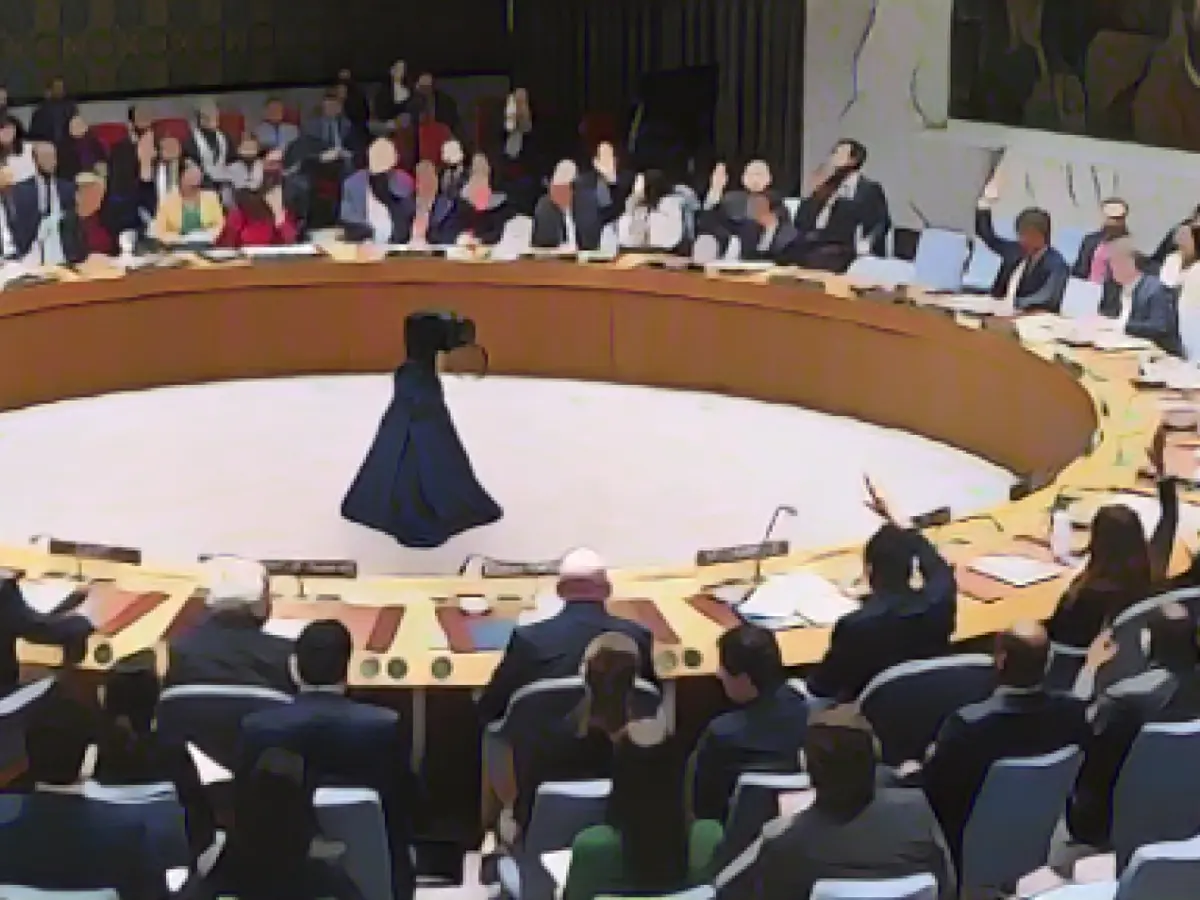UN Security Council resolution calls for comprehensive aid for Gaza Strip
Thirteen of the 15 member states of the most powerful UN body voted in favor of the resolution, with the veto states USA and Russia abstaining. The members of the Security Council had spent days arguing fiercely over the wording of the resolution. The final vote on the resolution was postponed several times.
A central point of contention was the possible demand for an immediate ceasefire. A corresponding passage was not included in the resolution. It merely states that conditions must be created "with all urgency" to enable "a sustainable cessation of hostilities".
Russia had wanted to include a call for an immediate ceasefire in the text, but this was vetoed by the USA. The United States thus joined forces with its ally Israel, which rejected the inclusion of the term "ceasefire" in the resolution. However, Israel itself is not currently a member of the UN Security Council.
With regard to aid deliveries, the resolution states that all routes in and through the Gaza Strip must be used, including the border crossings. Earlier on Friday, a UN report was published warning of an imminent famine in the Gaza Strip: it was likely that more than half of the population would be at risk of "acute food insecurity" over the next six weeks.
After weeks of pressure, Israel only opened a second border crossing, Kerem Shalom, for the delivery of aid to the Gaza Strip this week. According to Hamas, however, Kerem Shalom was fired upon by the Israeli army on Thursday.
Shortly after the resolution was passed, UN Secretary-General António Guterres described the Israeli military offensive as the "real problem" for humanitarian deliveries. This would create "massive obstacles" to the distribution of these goods. He reiterated his call for a "humanitarian ceasefire.
For its part, Israel announced after the adoption of the resolution that it would continue to control all humanitarian deliveries to the Gaza Strip. This was necessary "for security reasons", wrote Foreign Minister Eli Cohen in the online service X (formerly Twitter). The UN resolution refrained from demanding that deliveries be controlled "exclusively" by the UN. Instead, only a United Nations humanitarian coordinator is to be appointed.
One of the controversial points in the negotiations at UN headquarters was that the text of the resolution refrained from condemning Hamas' large-scale attack on Israel. This was heavily criticized by the USA.
Nevertheless, the USA refrained from blocking the adoption of the resolution with a veto. US Ambassador Linda Thomas-Greenfield subsequently even praised the resolution as a "strong step forward". The Security Council had thus created "a spark of hope in a sea of suffering".
Russian UN Ambassador Vasily Nebenzia, on the other hand, criticized the resolution as "toothless" - even though Russia also refrained from using its veto right. Nebensia accused the US negotiators of having watered down the text by exerting pressure.
The Security Council had repeatedly been accused of behaving inactively in the face of the war, which has now been going on for eleven weeks. This was the second resolution on the conflict adopted by the body. In its previous resolution on November 15, the Security Council had called for "humanitarian pauses" in the fighting.
Hundreds of Hamas fighters had invaded Israeli towns on October 7 and committed atrocities against civilians. According to Israeli reports, around 1140 people were killed and around 250 people were taken hostage in the Gaza Strip. Since then, Israel has carried out massive attacks in the Palestinian territory - with the declared aim of destroying Hamas. According to the Hamas-controlled Ministry of Health, which cannot be independently verified, at least 20,000 people have been killed so far.
Read also:
- This will change in December
- Attacks on ships in the Red Sea: shipping companies avoid important trade route
- Houthi rebels want to launch further attacks despite international coalition
- USA forms military coalition against Houthi attacks on ships in the Red Sea
- Despite the USA and Russia's abstention, the UN Security Council passed a resolution calling for comprehensive aid for the Gaza Strip, with a focus on using all routes for aid delivery, including Kerem Shalom.
- The resolution, in favor of 13 members, did not include a direct demand for an immediate ceasefire due to opposition from the USA and Russia.
- The absence of an immediate ceasefire demand in the resolution was a contentious issue, with Russia pushing for its inclusion and being vetoed by the USA.
- In response to the resolution, Israel announced it would continue controlling all humanitarian deliveries to the Gaza Strip, citing security reasons.
- According to a UN report, the Gaza Strip is currently facing an imminent famine, with more than half of the population likely to be at risk of acute food insecurity over the next six weeks.
- The USA, though critical of the resolution's failure to condemn Hamas' large-scale attack on Israel, chose not to block its adoption and instead praised it as a "strong step forward."
- Despite Russia's criticism of the resolution as "toothless," both it and the USA refrained from using their veto rights in the Security Council voting process.
- The passing of the UN resolution was viewed as offering a "spark of hope in a sea of suffering" by US Ambassador Linda Thomas-Greenfield, despite ongoing conflict between Israel and the Gaza Strip.
Source: www.stern.de







